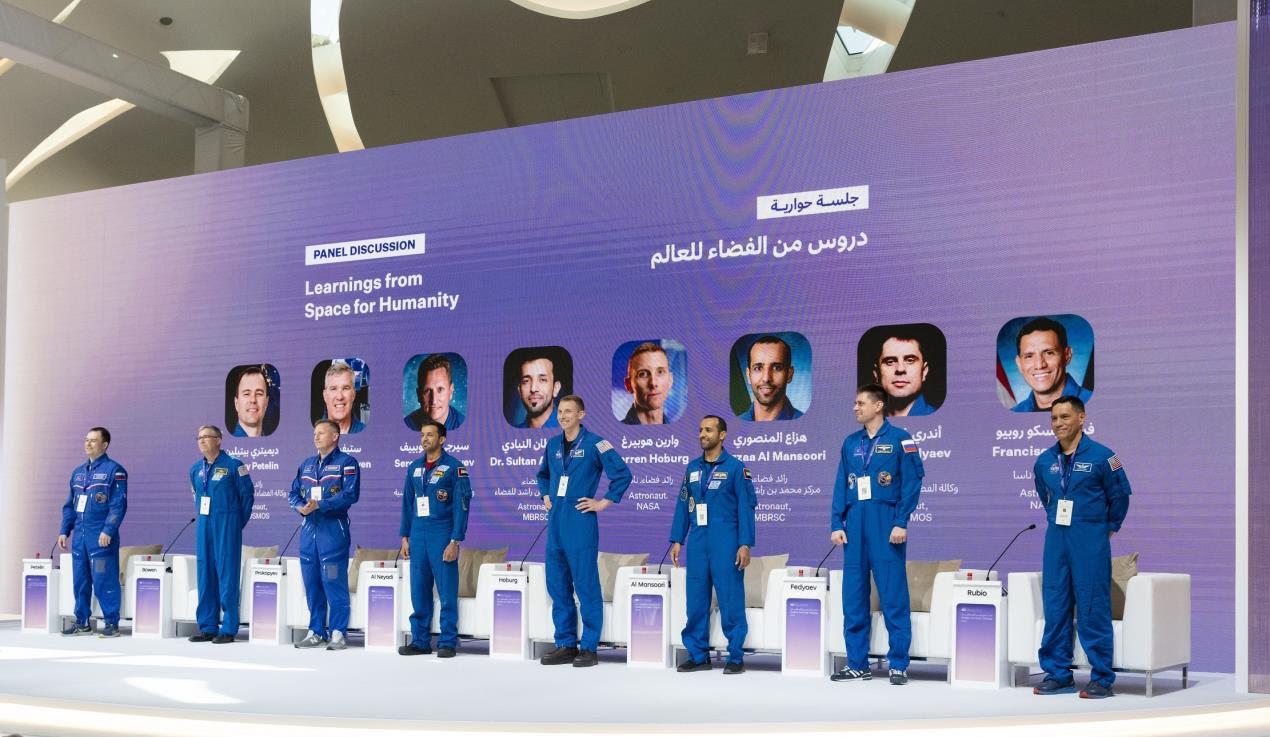
NASA Expedition 69 Crew Reveal Exclusive Mission Insights At Dubai Future Forum 2023
Eight astronauts and cosmonauts, including UAE astronauts provide a glimpse into the 186-day ISS mission, including how they lived and worked as well as research they conducted.
Dubai-UAE– The NASA SpaceX mission crew of Expedition 69, including Emirati astronaut Dr Sultan Al Neyadi, who became the first Arab to do a spacewalk, today revealed exclusive insights into their six-month mission aboard the International Space Station (ISS).
Speaking at the Dubai Future Forum, a panel of astronauts and cosmonauts from the NASA-led Expedition 69, which splashed down earlier this year, discussed their mission objectives, which included the development of cutting-edge technologies and conducting groundbreaking scientific experiments in zero gravity.
Hazza Al Mansoori, the UAE's first astronaut and Increment Lead during the mission, joined Al Neyadi on the panel. He revealed:“Expedition 69 successfully completed over 200 experiments aboard the International Space Station.”
Al Mansoori also recalled the“overwhelming feeling” of looking at our planet from space:“The perspective we have, the appreciation of what we have here on Earth, it's really huge.”
Al Neyadi was similarly awed by his spacewalk:“Going out and seeing the vastness and darkness of space, it was really incredible.”
“What kept me really focused was knowing that this is a lifetime opportunity,” he added.
Joining Al Neyadi and Al Mansoori were NASA astronauts Stephen Bowen, Woody Hoburg, and Francisco Rubio, as well as State Space Corporation ROSCOSMOS cosmonauts Sergey Prokopyev, Dmitry Petelin and Andrey Fedyaev.
Bowen noted how new discoveries are made in space“every day” that impact life on Earth. Hoburg spoke about how the crew 3D printed human meniscus for the first time during their research mission, which could support major advances in healthcare.
Prokopyev commented:“We conducted numerous experiments during our mission, which will be invaluable for future studies and research in deep space.”
The eight astronauts and cosmonauts on the panel, who have spent more than 50,000 hours in space between them, including during the 186-day mission on the ISS, shared how they coped with being separated from their families for so long.
“It's difficult to adapt to life on the space station. The most challenging thing is to leave your family for many months,” said Petelin.
Al Mansoori spoke about the importance of keeping in touch:“We need to be there for [our family] as much as they need to be there for us.”
Inspiring a generation:
Al Neyadi also described the huge impact of the country's recent space exploits. He emphasised how young people across the UAE now aspire to become spacefarers since he and Hazza Al Mansoori became the first Arab astronauts to travel to space in around three decades.
He said:“The primary goal was to reach every student and provide them with insights about missions to the International Space Station. The impact was significant. After Hazza's mission, students going to school would say they want to be like Hazza.”
Rubio reflected on how international space missions“serve as great example” of what humans can do when they have a mutual goal. Meanwhile, Fedyaev described the“amazing” feeling of zero gravity.
The Dubai Future Forum takes place on 27-28 November under the patronage of His Highness Sheikh Hamdan bin Mohammed bin Rashid Al Maktoum, Crown Prince of Dubai, Chairman of the Executive Council and Chairman of the Board of Trustees of the Dubai Future Foundation.

Legal Disclaimer:
MENAFN provides the
information “as is” without warranty of any kind. We do not accept
any responsibility or liability for the accuracy, content, images,
videos, licenses, completeness, legality, or reliability of the information
contained in this article. If you have any complaints or copyright
issues related to this article, kindly contact the provider above.


















Comments
No comment